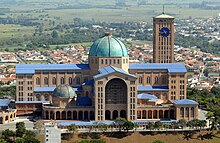Basilica of the National Shrine of Our Lady of Aparecida
| Basilica of the National Shrine of Our Lady of Aparecida Basílica do Santuário Nacional de Nossa Senhora Aparecida |
|
|---|---|

Basílica do Santuário Nacional de Nossa Senhora Aparecida
|
|
| Basic information | |
| Location | Aparecida, Brazil |
| Affiliation | Catholic |
| Rite | Roman Rite |
| Province | Archdiocese of Aparecida |
| Year consecrated | 4 July 1980 |
| Ecclesiastical or organizational status | Minor basilica |
| Website | Official Shrine website in Portuguese |
| Architectural description | |
| Architect(s) | Benedito Calixto Filho |
| Architectural type | Church |
| Architectural style | Romanesque Revival |
| Specifications | |
| Capacity | 45,000‒70,000 |
| Length | 173 metres (568 ft) |
| Width | 168 metres (551 ft) |
| Height (max) | 100 metres (330 ft) |
| Dome height (outer) | 70 metres (230 ft) |
The Basilica of the National Shrine of Our Lady Aparecida (Portuguese: Basílica do Santuário Nacional de Nossa Senhora Aparecida) is a prominent Roman Rite Catholic basilica located in Aparecida, Brazil. It is dedicated to Our Lady Aparecida, (a variant of the Immaculate Conception) as the principal Patroness of Brazil. Nossa Senhora da Conceição Aparecida roughly translates to Our Lady of Conception Who Appeared. It is the second largest church in the world, after St. Peter's Basilica in Vatican City.
The present basilica was constructed nearby an earlier chapel which housed the statue found by three fishermen in the town of Guaratinguetá. According to local tradition, the group was attempting to catch a large amount of fish in the Paraíba River for a banquet honoring the visit of São Paulo Governor, Pedro de Almeida in 1717. Despite their prayers, their attempts were fruitless until late in the day, one of the fishermen cast his net and pulled it back to find the statue of the Virgin Mary. Upon his next cast, he found the head. The group cleaned the statue, wrapped it in cloth, and returned to their task to find their fortunes had changed and they were able to obtain all the fish they needed. The statue is believed to be the work of Frei Agostino de Jesus, a monk residing in São Paulo.
The old wooden chapel was originally built in 1745. The old shrine is a modest church in the colonial style built between 1834 and 1888. Since that time, pious worshippers have termed it as a basilica.
Due to the following conflicting accounts on dates, the Vatican has enumerated the following recorded Papal documents:
...
Wikipedia
